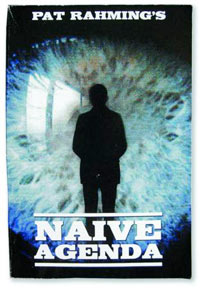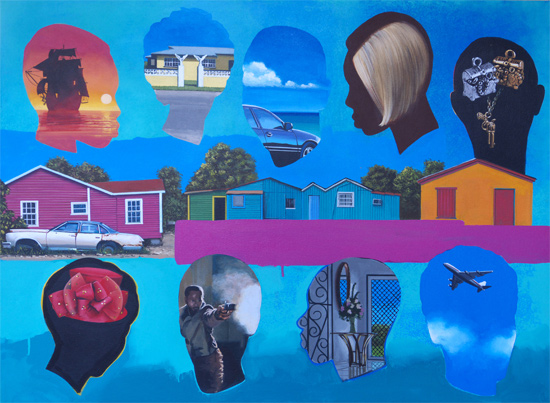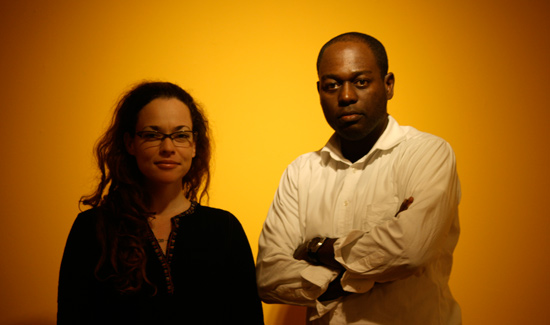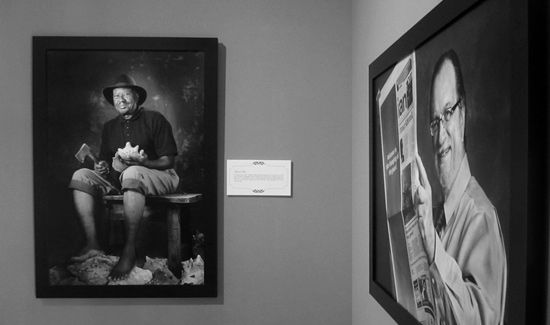
Patrick Rahming can be credited with writing some of the first songs examining social discord in post-Independence Bahamian paradise as well as for penning a significant collection of thought-provoking poetry – yet for years he’s also shared his views in speeches and open letters.
In 1992, he published these pieces in “The Naive Agenda” as an attempt to jump start a national conversation about the then dismal state of society and how to begin taking steps to work towards a better future.
Flipping through the book that examines the reasons and solutions for the alarming rate of criminality in the 1980s, you may think – if not for the discussion of cassettes dating the collection – that Rahming’s discourse concerns the present day, giving the phrase “the more things change, the more things stay the same” a particularly sad ring.
It’s pertinent, therefore, that Rahming should take this crucial time of change – coming into 40 years of Independence next year – to republish the book. Decades of distance have only made his points more clear – The Bahamas is facing a dangerous turning point with crisis on all levels of society, politics, and culture.
“We haven’t yet asked ‘what is the point?’” says Rahming. “The reason for publishing it now is to see if I could again beg the community to ask that.”
Indeed at this time where Urban Renewal 2.0 – and now the bizarre early planning for 40th anniversary celebrations – seems to be the order of the day for government, Rahming questions just how much this will do for the long term in the country.
“The way the conversations about urban renewal have been framed – cleaning up streets, police action, community centers – isn’t even about honoring communities,” he said.
“If you’re going to deal with trying to regenerate community and neighborliness, the least you have to do is put some energy into how neighborhoods work – you can’t make them work because you passed legislation saying this street to this street is Bamboo Town, this street to this street is Bain town.”
“Those artificial political boundaries are not communities,” he added. “You can’t create neighborhoods by ignoring how neighborhoods exist. So you can’t bring in community centers or else the center will be an expression of community life as opposed to a fixture of community life.”
In the four sections of “The Naive Agenda” – Cultural Development, Anti-Social Behavior, Education, and Political Responsibility – Rahming proposes that the solution to the problem of criminality truly lies in improving self-image, for an understanding of the self in context provides value and morality to a person’s life.
“You can’t influence violence from the outside. It’s an inside job,” says Rahming. “What we do is a manifestation of who we are inside. Poverty and crime have nothing to do with each other. But we reinforce it, even in parliament. We say if we don’t get people more income, they’re going to turn to crime. Well, that’s foolishness. If we don’t give people a vision of themselves that is worthwhile, they will turn to crime. That makes more sense.”
“I think this idea we have that there is something we can do on the outside to affect how people behave has been proven wrong so many times that we have to look in the mirror and say that really ain’t it.”
To improve self-image, Rahming’s essays constantly refer to three major components to develop confident, self-aware and motivated individuals who, rather than turn to crime, can function within and contribute to society in positive ways.
The three necessary components are a sense of history (where education plays a role especially in the teaching of African history and contemporary Bahamian history, as well as in the teaching of local literature); a relationship with the supernatural (in which the individual develops self-esteem in their understanding of Universal forces); and a sense of uniqueness by association (in which cultural activity secures in the individual a sense of being unique within his national identity).
Cultural activity and history, therefore, play major parts in stable social life and contributing to this strong self-image. In essays examining the destruction of Jumbey Village, pride in music and also a look at the future of Junkanoo, Rahming identifies the serious need to preserve and develop culture alongside history in order to improve society – something that Bahamians have largely failed to appreciate due to a combination of miscommunication and apathy from the communities who can bring art, culture and history to the forefront.
“It’s difficult to continue to experience the separation between the people who make policy and the people who understand the policies that are being made,” said Rahming. “The artists in the community have a responsibility to help the rest of the society understand and develop wisdom.”
“As a society we keep expecting politicians to help us develop vision, but they can’t. Politics is the institution if the past – its role is to maintain the status quo,” he continued. “Journalism is the institution of the present – its role is to help us understand what is going on now. Art is the institution of the future – its role is to help us develop vision, and artists need to take that seriously.”
Rahming certainly undertook a huge task with the development of his theories throughout the essays contained in “The Naïve Agenda”. Even though the words ring true – perhaps true enough to hurt – it’s gone relatively unnoticed, and we’ve suffered the consequences through the twenty years since its first publication.
This book should be mandatory reading for all individuals, especially those charged with making policy and outlining a vision for the future of this country. Here now is a second chance to begin this national conversation so badly needed, and if we ignore our problems again, we are not serious about improving our future.
“Where we are at in the world is that our self image is badly in need of support and we are not addressing it,” said Rahming. “It may seem in a sense that I have blame issues. I really don’t blame anybody for any of this except myself.”
“Everything that has happened to us is natural – what is becoming unnatural is having gotten here and having recognized that this is where I am and choosing not to do anything about it because our self-image is so weak that we’re refusing to take the risk.”
“The Naïve Agenda” by Patrick Rahming can be found at Buy the Book on West Bay Street and Books & Things at Festival Place.
By: Sonia Farmer
The Nassau Guardian



